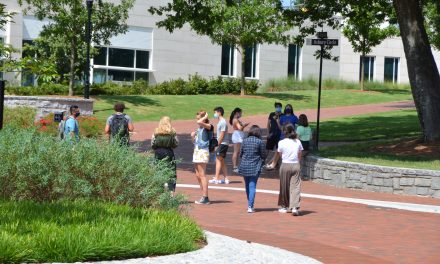College Council (CC), which has struggled with retention and attracting students to run for office, is seeking applications after three members resigned last month. The governing body is also planning to hold standards hearings for some members who allegedly failed to perform their duties.
Former CC Vice Presidents of Student Affairs Muhammad Naveed (17Ox, 19C) and Leslie Mora (20C) and CC Junior Legislator Namit Sanghi (18Ox, 20C) quit, according to CC Vice President Hemal Prasad (19C).
Naveed, who formerly served on Student Government Association (SGA) as Oxford continuee representative, said he left CC to focus on schoolwork and finding a job.
“[U]ltimately the rigors of the position were something that I could not handle personally,” Naveed wrote in a Nov. 2 email to the Wheel. “I had to leave the position to focus on my academics and job recruitment to ensure that my life after college was secured.”
Sanghi and Mora did not respond to requests for comment.
Sanghi resigned the week of Oct. 21 while Naveed and Mora resigned the week of Oct. 14, according to Prasad. He said that the three students had left by “no fault of their own, but a result of their own personal circumstances.”
CC sent an Oct. 30 email to all College students seeking applications for the vacant positions. Prasad said applications are due on Nov. 9, after which he and CC President Radhika Kadakia (20C) will interview applicants.
Prasad said he hopes to fill the roles before the Nov. 14 CC legislative meeting.
CC co-Chief of Staff Julian Pradeep (19C) said he and other co-Chief of Staff Jacob Hicks (18Ox, 20C) will serve as interim CC vice presidents of student affairs. Vice presidents of student affairs are responsible for hearing student feedback, holding focus groups and compiling and releasing the annual student concerns report, which “summarizes the initiatives completed and feedback collected throughout the year,” according to the Oct. 30 CC email.
Applicants for vice president of student affairs should be “in touch with the Emory community, in regards to hearing their … complaints” and applicants for junior legislator should be “self-driven, having cool ideas for changes to make on campus [and] always willing to work on committees,” Prasad said.
CC previously appointed five legislators in September to fill vacant positions. After the most recent departures, six of CC’s 20 legislators will have been appointed by Prasad and Kadakia instead of elected by the student body.
Prasad said he is not worried about the number of elected CC seats that have been filled by appointment.
“It may look like a lot of appointing from the outside, but you also have to remember this is the biggest governing body on this campus,” Prasad said. “Inevitably, there’s going to be [turnover].”
Standards Hearings
Prasad also announced during the Oct. 31 meeting that CC would begin standards hearings on Nov. 6 for underperforming members, including those with attendance issues. Standards hearings are required for members with more than three absences, according to the CC Constitution.
Prasad said he will lead the hearings, which are currently scheduled for Nov. 9, and explained that the process is necessary because CC does not have its own judicial body.
“Attendance is the primary reason why people are called into hearings,” Prasad said, but also noted that, “[Members] can be called into hearings for a variety of reasons — bad behavior [or] negligence to do your job.”
During the hearings, Prasad will inform members where their performance is lacking, and they can develop a reformative plan or face punishment.
Although Prasad explained that the hearings are meant to be “reformative and not punitive,” he noted that some members had been removed from office in the past.
“We have these hearings as a reality check,” Prasad said. “If we find that they don’t necessarily mesh with [College] Council because of schedule, or they just don’t want to serve anymore, then they are removed.”
Article IV, Section B of the CC Constitution states that “any individual may be removed from office by a two-thirds vote of the Legislature, a two-thirds vote of the Executive Board or directly by the discretion of the President.”
According to the CC Constitution, members can be removed for “inattention to duties, violation of the attendance policy … or failure to act in the best interest of the College and/or the College Council.”
Prasad declined the Wheel’s request for access to the hearings but said he would be willing to provide a list of any members who are removed.
aliang6@emory.edu | Albert Zhang (22C) is from Dallas.





